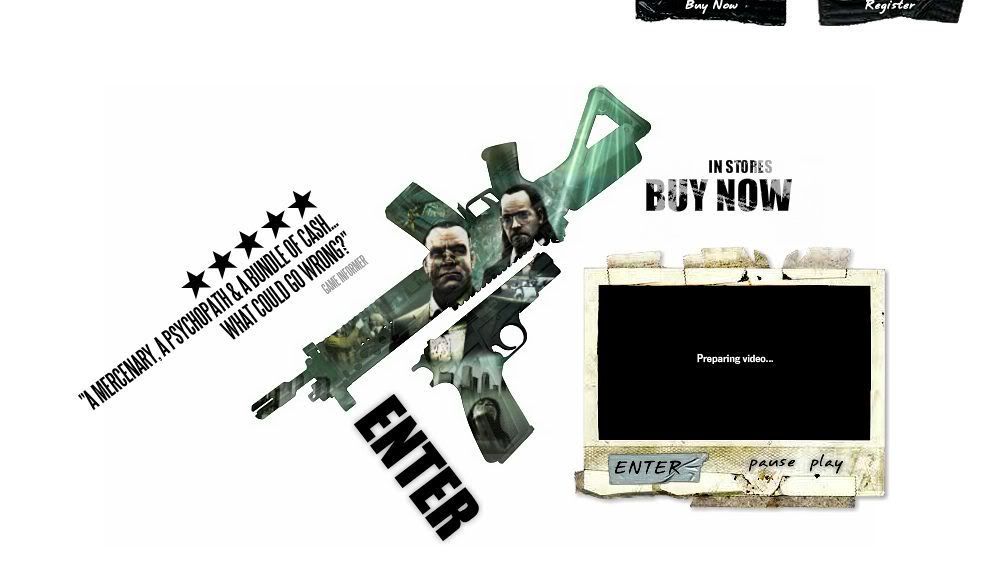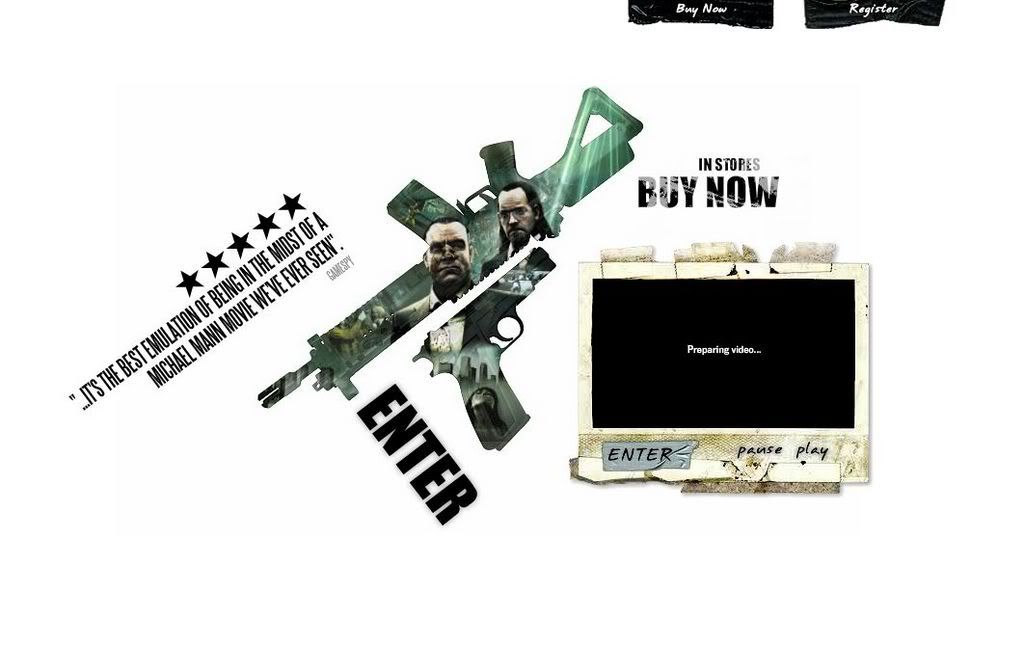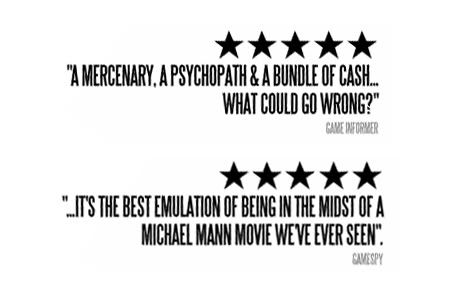(By the way, take a look at what I saw in the local Gamestop today. No Spanish for Everyone yet, though.)
Today, on the other hand, I'm going to talk about something bigger than some quirky, politically incorrect game. You see, there are big rumblings in the industry right now. There is a scandal!
And no, this isn't like another Brittany Spears-style scandal, this is a real controversy that may have large repercussions for a few major players in the industry, and may shake up the underpinnings of an integral part of the video gaming universe. If I were to equate it to an American political scandal, I'd say...well, it wouldn't be Watergate, but I'd say maybe Iran-Contra Affair level. Eh, maybe Blackwater.
Anyhoo, let me start by saying that video games are no stranger to scandal and controversy. But you already knew that, what with all the hullaballoo about games like Grand Theft Auto and Manhunt II, the demands to ban video gmaes, use the governement to regulate them, etc.
However, despite the game in question being a violent, foul-mouthed shoot-em-up, that is not the source of the controversy. The controversy has to do with something that many people have taken for granted: reviews.
Enter the players:
Kane & Lynch:Dead Men - The video game in question, developed by IO Interactive and published by Eidos Interactive, known, among other things, for their Tomb Raider series. According to the powers-that-be, "The game depicts a violent and chaotic journey of two men — a flawed mercenary and a medicated psychopath — and their brutal attitude towards right and wrong."
Gamespot - Not to be confused with the retail chain Gamestop, Gamespot is the most-visited video-game related website (according to Alexa web rankings) with news, previews, reviews, downloads, etc, etc. It's owned by proverbial megalith CNET Networks.
Jeff Gestermann - A well-known and well-respected video game reviewer who has worked with Gamespot for a full 11 years.
Everyone Else - That means you and me.
Act 1.
So, this game, Kane & Lynch came out. Very, very hyped game. Advertising all over the place. Movie plans already in place. Big stuff, very big. So, how did it fare against the reviewers? Not too hot. According to Metacritic, a website that averages different reviews, it recieved a 67/100, meaning "Mixed or Average Reviews". Now, one particular review here was important.
That was the review of one Mr. Jeff Gestermann. He gave the game a 6.0/10, which, according to the Gamespot scale, means it is a "Fair" game. However, this is not a good "fair." In most cases, any score less than a 7.0 is essentially a warning: "Do Not Buy." So, Mr. Gestermann thought there were problems, and so he didn't recommend the game. Oh well, right? Just another game destined for the bargain bin. Happens all the time; nothing to cry over.
Wait, maybe I should clarify something.
You see, when this review (and the related video review) were posted, there was Kane & Lynch advertising on the website. Major advertising. Full-site advertising. You see, they actually had a Kane & Lynch skin on the site, meaning that the sidebars on every page of the website were ads for one game. Gamespot was apparently being paid hundreds of thousands of dollars for these ads, with hundreds of thousands more coming to them in the following week.
About a day after the review went up, three things happened.
1. The Kane & Lynch ads were removed from the website.
2. The video review was removed from the website.
3. Jeff Gestermann was removed from the website.
By which I mean, he was fired. Suddenly, and inexplicably. According to an anonymous tipster, Gestermann was fired due to the "tone" of his review. And then it all came tumbling down.
Now, gamers may accurately be described as solitary, poor, nasty, brutish, and (occasionally) short, but they have a tendency of working in large numbers (a "guild mentality," if you will). And before you know it, there was talk of boycotts, petitions, and everything in betwixt. Employees at fellow game sites picketed outside Gamespot's headquarters. Other sites began satirizing the situation. As far as Kane & Lynch goes, forget about it. User scores on the various websites are in the pits, sometimes hovering in the 20s range (out of 100). With one exception: the reviews of the game on GameFAQs, few though they are, seem to be quite positive.
Oh wait, ratings for the game have been disabled on GameFAQs. Oh wait, GameFAQs is owned by CNET Networks. ....*Facepalm*
It actually took Gamespot over a week to make any sort of statement about the issue. In it, they take the straight line and say that Gestermann's firing had nothing to do with pressure by advertisers, and that the two events were merely "coincidental." Now most people - myself included - are calling "BS" on this. Coincidence is all fine and good, but when an advertiser "coincidentally" removes a boatload of potential revenue, then I start to cry foul.
To be honest, though, this is still going on, and there is still lots of speculation. I'm surprised nobody has asked Gestermann about the situation himself, but either he can't be found, or isn't allowed to talk. It's definitely an evolving story, though, and there's no way of knowing how it will pan out.
Act 2.
This literally popped up last night. When one goes on to the official game website, and watches the flash intro, they see the following screens pop up:

 I'll forgive you if you don't know what I'm talking about. The parts that I'd like to point out are the little blurbs on the left. Here they are for easy reading:
I'll forgive you if you don't know what I'm talking about. The parts that I'd like to point out are the little blurbs on the left. Here they are for easy reading: Now, what do these resemble to you? Reviews and ratings, perhaps? Indeed they do! However, they are nothing of the sort! Those little blurbs are actually from game previews, written well before the game was ever released or even finished. Speculation, you may even call it. And the stars? Completely meaningless! In fact, according to my source, Kotaku, Gamespy gave the game 3 stars, and Game Informer (who doesn't even use stars) gave it a 7/10.
Now, what do these resemble to you? Reviews and ratings, perhaps? Indeed they do! However, they are nothing of the sort! Those little blurbs are actually from game previews, written well before the game was ever released or even finished. Speculation, you may even call it. And the stars? Completely meaningless! In fact, according to my source, Kotaku, Gamespy gave the game 3 stars, and Game Informer (who doesn't even use stars) gave it a 7/10.So basically, the website is lying about the scores that are being given to it's game.
Now, there are some people who are claiming, "Oh, just because there are stars, that doesn't mean it's a rating. It could be used as decoration, or to separate things, like so."
*****
However, what's there to separate? On the site, those things are standing on their own. And if they were to be purely decorative, then I would have made them more...centered. However, even if "decoration" is the official company line (as I'm sure Eidos will present it), then it is, at best, incredibly deceptive. When one sees a line of stars above or below a line of text relating to the product, 99% of the people who see it will think it is a review. That's just how our modern mind works. Stars = Ratings. It's done with movies, books, and games. To use them in this deceptive capacity, I believe, is simply cheating the customer.
So in this, Eidos has dug themselves deeper and deeper. There are two types of "bad" press in video games (and probably in all other forms of media). The first type is "good-bad" press, which means that the controversy surrounding game actually boosts sales. The poster boy for this is the Grand Theft Auto series, which mainly sells through both shock value and through its roguish nature. Then you have "bad-bad" press, which is exactly what Eidos has now. This is only going to hinder their already weak sales.
If you ask me, they should have spent less money in their massive ad campaign and more in actually making the game good. Then there wouldn't be a problem.
Epilogue.
Now, while this entire scandal is far from over, it seems as though it is going to have implications reaching far beyond Kane & Lynch, Eidos, or even Gamespot. At the very core of this controversy is the game reviewing system, and it has led many people to question its efficacy.
As much as people want to deny it, the fact is that reviews have major impacts on game sales. Games are becoming more and more expensive, yet renting games has become less and less common (don't ask me why). People, thus, are relying more and more on the opinions of others, particularly the so-called "experts." And as I said earlier, if a game's average rating is below a 6/10, it's not going to sell well at all, as that is essentially a "don't buy".
The question being asked now, then, is why do we even have a quantitative ratings system at all if only the top third of points matter? If everything below a 6 is "don't buy" territory, does it need to take up six slots on the scale? And on the other side, why does it matter whether a game gets a 9 or a 10? Both are excellent games you should buy. That's two more slots wasted.
When I'm deciding whether or not to watch a movie, I have three different places I can be, depending on the score (of four stars):
3-4: Definitely go.
2 - 2.5: Eh, give it some more thought.
<2: style="font-style: italic;">will be consequences for all those involved.
There, I hope you were able to follow all that. It's complicated, I know, but then, any controversy is. I just hope you have a little more idea of how video gaming isn't all fun and games. It's serious business. :O

2 comments:
Andrew, you're starting to seem like the Kieth Olbermann of video gaming. Not only was your piece well researched, but your commentary is remincient (though less passionate) of a Special Comment.
Ah, again the difference between capitalism and Sovietism: Both are corrupt, but everyone knows that corruption exists in a Soviet system. In a capitalist system, it's all drowned behind the scenes under hush money.
-Comrade Chavez
If I want to be like Keith Olbermann, I need to start saying "Shame on you!" a lot more. :P
Post a Comment